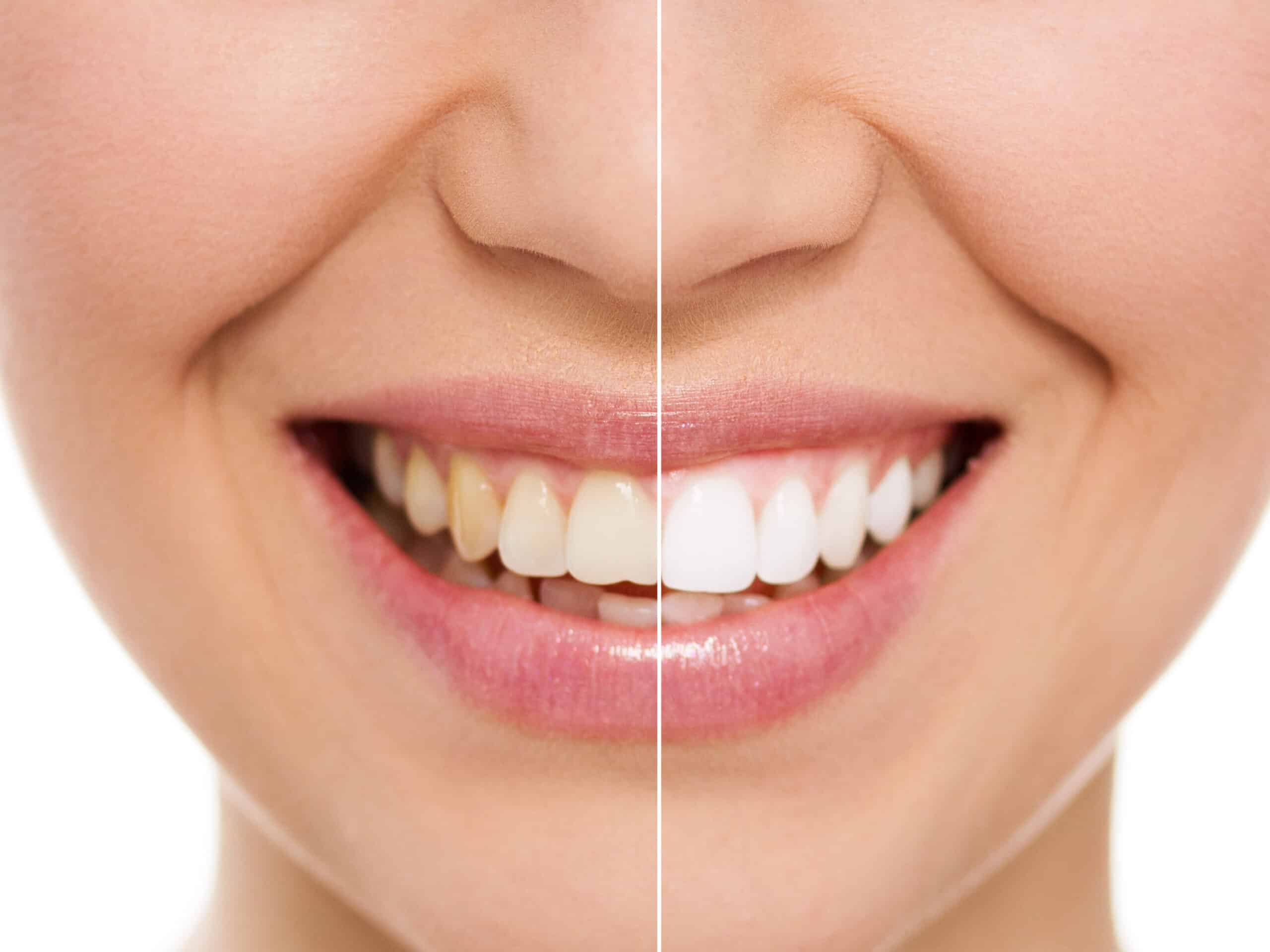
Discolored, yellow, or stained teeth can be a source of discomfort or embarrassment to many people. While discolored teeth aren’t always an indicator of poor oral health, many people choose to whiten them. There are many different options for those who want whiter teeth and even ways to prevent discoloration in the first place. Read on to discover the causes of tooth discoloration, the options available to remedy it, and the benefits and drawbacks of each method.
Causes and Prevention

Most people’s teeth are naturally slightly yellow, not bright white; however, there are many different factors that can cause further staining or discoloration. Some are unavoidable, like aging or disease, but others can be prevented through proper oral hygiene and diet.
There are two different types of tooth discoloration: intrinsic and extrinsic. Intrinsic discoloration starts on the inside of your tooth and is caused by dental trauma or certain medications, and extrinsic discoloration affects the outside of the tooth and is caused by environmental factors, such as:
- Food and beverages: Dark-colored drinks like coffee, tea, and soda, along with soy sauce, can cause yellow stains on the surface of your teeth. If you drink a lot of red wine, you may develop purple spots on your teeth.
- Tobacco use: If you smoke or chew tobacco, you are likely to experience brown tooth discoloration.
- Excessive fluoride: While in moderate amounts, fluoride strengthens teeth and prevents cavities, if you get too much, especially during childhood, it can cause you to develop a condition called fluorosis. Fluorosis causes white spots on your teeth’s enamel.
- Poor dental hygiene: If you don’t remove and prevent plaque with regular brushing and flossing, the bacteria on your teeth can cause discoloration. Tooth decay appears as black spots on the teeth.
While these things are avoidable, some causes of tooth discoloration are not. These include:
- Genetics: Natural tooth color varies from person to person.
- Dental trauma: If your teeth encounter trauma from a fall, car crash, or sports injury, you may experience grayish discoloration, which can mean that the nerve inside the tooth has died.
- Aging: Tooth enamel wears down and becomes thinner as you age, which exposes the yellowish dentin underneath.
- Dental treatments: Sometimes, silver fillings can make your teeth appear grayish. Some root canal treatments can also cause tooth discoloration.
- Disease: Some health conditions, such as liver disease, celiac disease, eating disorders, metabolic diseases, and calcium deficiency can cause teeth to become discolored.
- Medications: You may experience tooth discoloration as a side effect of certain medications that treat allergies or high blood pressure. Additionally, if you took the antibiotics tetracycline or doxycycline as a child, you may notice tooth discoloration.
- Cancer treatment: Both chemotherapy and radiation therapy have been known to cause tooth discoloration.
While you may not be able to prevent all causes of tooth discoloration, you can practice good dental hygiene, visit your dentist for routine cleanings, and limit the amount of food and drink known to cause staining you consume. Developing good habits helps prevent extrinsic discoloration and preserve the brightness of your smile.

Whitening Options
If you would like to improve the appearance of your discolored teeth, there are many options available to you, from at-home treatments to professional teeth whitening at your dentist’s office.
At-Home Whitening Treatment
There are a plethora of over-the-counter treatments available at the drugstore that can help improve your teeth’s appearance, including bleaching trays, rinses, pastes, and strips; however, experts caution against using products with baking soda, charcoal, or citric acid, which can damage enamel and cause erosion. Talk to your dentist if you have questions about which product would be best for you.
Professional Teeth Whitening
Many people find professional teeth whitening treatments to be more effective than drugstore products. Professional whitening is a simple cosmetic dentistry procedure in which a powerful gel is applied to the surface of your teeth, either in the dentist’s office or as a take-home treatment. Many patients find that it helps improve discoloration in just one treatment, helping them feel more confident in their appearance and boosting their self-esteem.
Teeth Whitening at Eric Felt DDS
Whatever your dental needs are, the office of Dr. Eric Felt can help you! We offer cosmetic dentistry services such as teeth whitening and veneers, emergency dental care, general and family dentistry services such as cleanings and exams, pediatric dentistry, and restorative dentistry. Our office is located in Cottonwood Heights, Utah, and our team is proud to treat patients of all ages. Request an appointment today!


